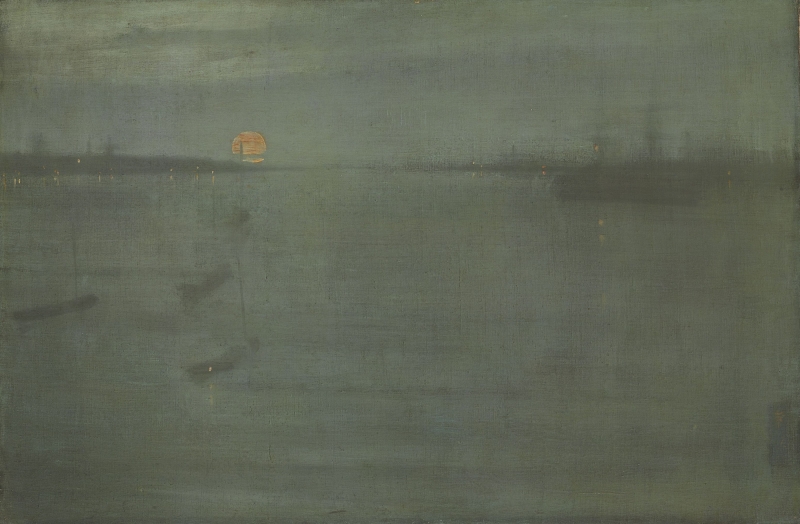Technique
The medium and technique have been analysed by Kimberley Muir at the Art Institute of Chicago. 1
The plain-weave canvas was prepared with a dark grey ground. 2 The paints used include lead white, cobalt blue, Prussian blue, iron oxide or earth pigments, vermilion, and bone black. Rubbing and scraping down was part of the painter's process, and in some areas, such as along the horizon, the weave of the canvas is conspicuous. It is painted very thinly, mostly in sweeping horizontal brushstrokes across the canvas. Muir's description of Whistler's technique is very helpful:
'In some areas, the artist applied additional layers of thin, fluid paint on top of the abraded paint, which form more continuous, smooth layers. Overall, the surface ... is very smooth and flat, with only localized use of thick, brush-marked paint: the light-gray streaky clouds in the upper left corner and the local touches of color used for the tiny, flickering lights and reflections in the water and for the moon. The moon was created with relatively thick pale-yellow paint; when this paint was still slightly soft Whistler applied a very thin layer of orange-red paint using a fairly dry brush. The first strokes were applied horizontally and then, over the right third, a final diagonal stroke was added. ... Finally, a stroke of gray paint, used for the mast of the boat below, was pulled through the soft paint.' 3
Conservation History
The conservation and condition of the painting are discussed by Kimberley Muir in the Art Institute of Chicago online catalogue. The paint surface appears uneven, possibly due to earlier cleaning. The painting has a slightly yellow and natural-resin varnish. There are small areas of craquelure and retouching. The canvas has been lined, and is in good condition. 4
Frame
1874: the original frame may have been painted and decorated by Whistler, as were Nocturne in Blue and Silver [YMSM 113] and Nocturne: Blue and Silver - Cremorne Lights [YMSM 115].
1900/1919: the painting is currently in a Grau-style American-made frame, probably dating from after 1900, possibly about 1919.
Notes:
1: Muir, Kimberley, 'Muir, Kimberley, 'Cat. 16 Nocturne: Blue and Gold—Southampton Water, 1872: Technical Summary,' in Whistler Paintings and Drawings at the Art Institute of Chicago, The Art Institute of Chicago, 2020, URL.
2: Muir 2020, op. cit., records this as 'a mixture of lead white and a carbon-based black, but it also contains a range of relatively large, colorful (red, yellow, orange, and brown) iron oxide or earth pigments.'
3: Muir 2020, ibid.
4: Muir 2020, ibid.
Last updated: 19th April 2021 by Margaret







